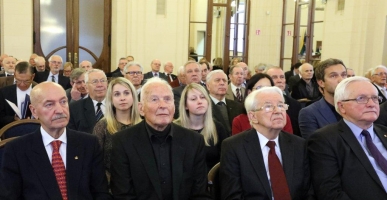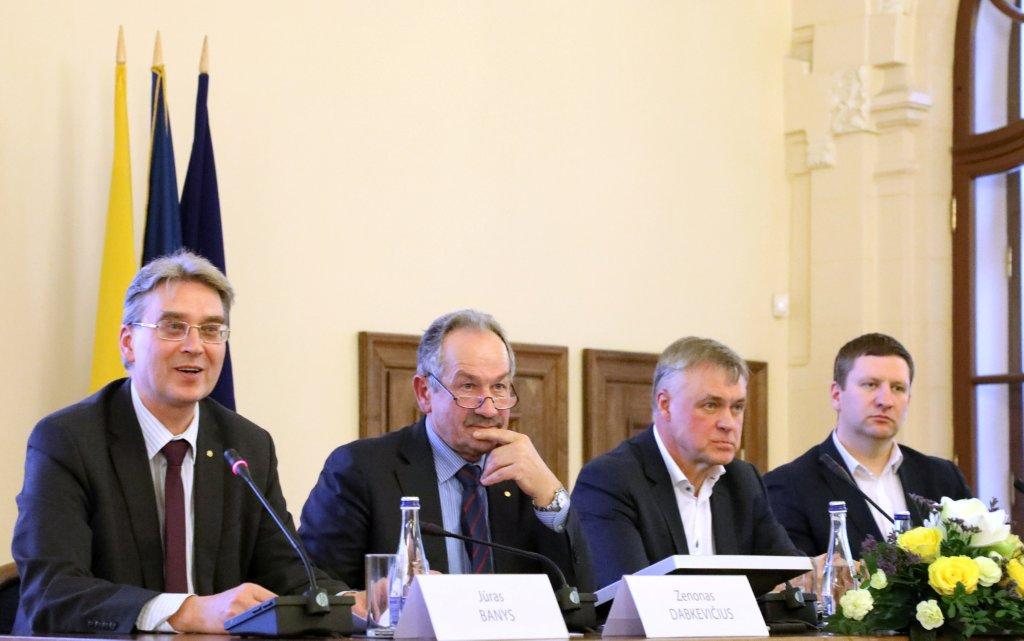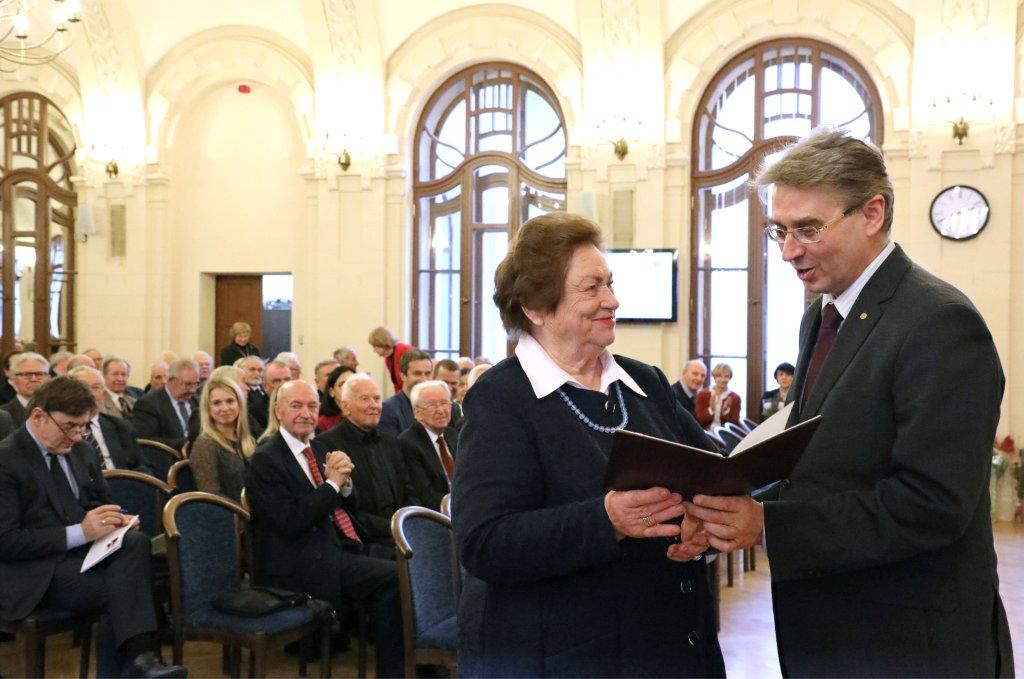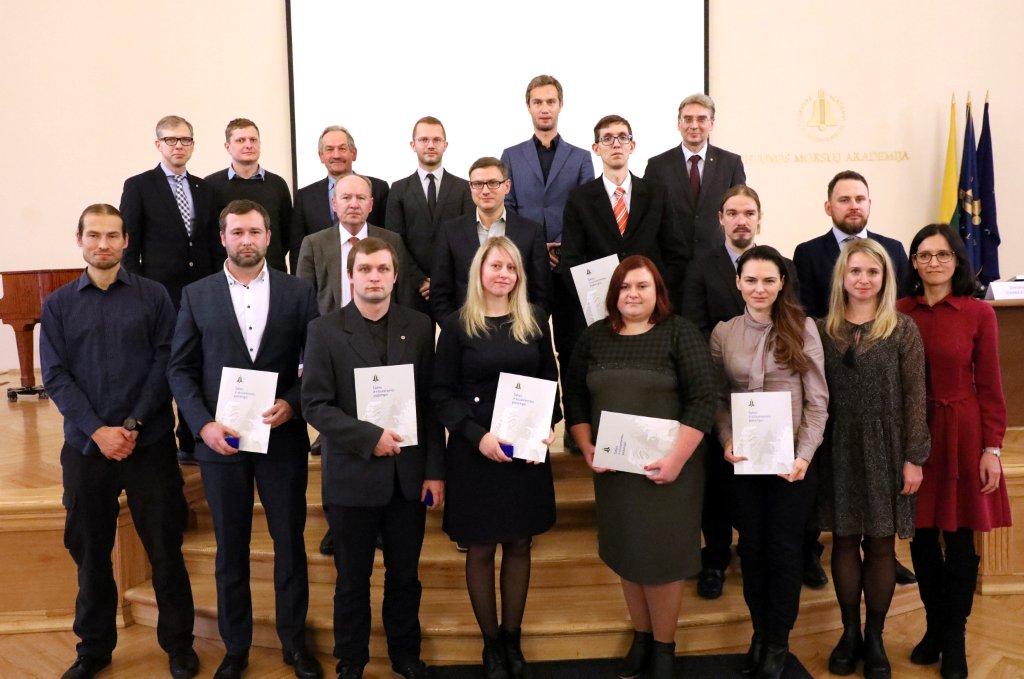Events
General Assembly of the Lithuanian Academy of Sciences on the Eve of 2020
19 12 2019
A festive general assembly of the Lithuanian Academy of Sciences was held on 17 December 2019. Professor Jūras Banys, President of the Lithuanian Academy of Sciences, reviewed the results of the closing year and the versatile activities of the Academy and its members. He voiced his satisfaction at the 170 events organised in 2019, participation in three projects of the EU Structural Funds, and active cooperation with regions of Lithuania. Among other activities, emphasis was placed on the participation of Prof. Jūras Banys at the event organised by All European Academies (ALLEA) that addressed the role of academies of sciences in the contemporary world and on his report at the European Organization for Nuclear Research (CERN) on the collaboration of Lithuanian scientists with this international research centre. Eleven new full members and one foreign member joined the Academy in 2019. The new foreign member is Gérard Albert Mourou, a recipient of the Nobel Prize. In 2020, the Lithuanian Post is to issue a special postage stamp to commemorate the centenary of birth of the outstanding Lithuanian mathematician and academician Professor Jonas Kubilius. 
Left to right:Prof. Jūras Banys, President of the Lithuanian Academy of Sciences, Prof. Zenonas Dabkevičius, Vice-president of the Lithuanian Academy of Sciences, Robertas Dargis, President of the Lithuanian Confederation of Industrialists, and Simonas Kairys, advisor to the mayor of Kaunas.
The Presidium of the Lithuanian Academy of Sciences and members of the Academy’s scientific divisions extended their best wishes to the academicians that celebrated their significant birthdays in 2019. A congratulatory address was awarded to Prof. Gintaris Kaklauskas, a letter of acknowledgement of the Presidium of the Lithuanian Academy of Sciences to Prof. Algirdas Sliesaravičius, and a commemorative medal of the Lithuanian Academy of Sciences with a certificate and a congratulatory address to Prof. Ramutis Petras Bansevičius. Commemorative medals with certificates were presented to academicians Vygantas Paulauskas, Vytautas Basys, Veronika Vasiliauskienė, Viktorija Daujotytė-Pakerienė, and Juozas Kulys. A minute of silence was observed in memory of Eugenijus Ušpuras, a full member of the Academy and the initiator of the school of research into nuclear safety and technological risk analysis in Lithuania, and of Jānis Stradiņš, an outstanding chemical scientist and a foreign member of the Lithuanian Academy of Sciences, former president of the Latvian Academy of Sciences and later the chair of its senate.

Prof. Veronika Vasiliauskienė and Prof. Jūras Banys, President of the Lithuanian Academy of Sciences
Robertas Dargis, President of the Lithuanian Confederation of Industrialists, delivered a talk on the potential of the collaboration of business and research. He stressed the concern of business about the situation in education because it is critical to create output of a higher added value if Lithuania seeks competition in the global and highly competitive world. Moreover so that about 180,000 people will leave the country’s labour market by 2025. Currently, the situation in economy is affected by a new – fourth – industrial revolution that is based on information technologies and systems of artificial intelligence. Business models are changing and the capitalisation of the large IT companies exceeds the market value of traditional spheres of industry by dozens of times. The European Union responds to this and is planning to increase funds for innovation promotion and design in the new funding perspective referred to as ‘Horizon Europe’. Unfortunately, the output of a low added value has prevailed in Lithuania up until now and the share of high-tech production comprises only 15 per cent. Effectiveness of scientific research and of the system of experimental development is also low (30% of the mean of the European Union). In Dargis’s opinion, collaboration between business and science should be more active and more joint business and research conferences should be organised. Industrialists seek a better understanding of what makes science tick and what ideas are developed in research. This might lead to a more effective use of the available resources, of the investment into artificial intelligence systems following the example of ‘Digital Europe’, and the like.
The festive general assembly honoured the recipients of the Science Prizes of Kaunas. Prof. Gintautas Žintelis, the chair of the evaluation board, read the minutes of the board meeting. Science Prizes of the City of Kaunas were awarded to Prof. Dr Gintautas Mažeikis of Vytautas Magnus University for his active and significant research work in the analysis of symbolic thinking from the viewpoint of the critical theory, and to Prof. Jurgis Kazimieras Staniškis, a member of the Lithuanian Academy of Sciences, for his outstanding work and highest calibre results in interdisciplinary research into sustainable industrial development and for bringing international fame to Kaunas and Lithuania. Simonas Kairys, advisor to the mayor of Kaunas, awarded the diplomas to the laureates, while Prof. Jūras Banys and Prof. Zenonas Dabkevičius wished them success in their future endeavours.
In his acceptance speech, Prof. Gintautas Mažeikis spoke of the creators and the history of the critical theory. Linking his speech with the talk given by Robertas Dargis, he stressed that symbolic thinking, the field of his research, is a highly relevant competence that helps scientists to join international research programmes, to participate in fierce competition against their foreign colleagues and, having gained recognition with their arguments, to become project leaders. In Mažeikis’s view, a shortage of such abilities and communication skills – especially at the ministerial level – is very often an obstacle for the teams of Lithuanian researchers seeking to become ‘Horizon Europe’ project leaders.
The other laureate, Prof. J. K. Staniškis, gave a talk ‘Sustainable development: local and global solutions’. He spoke about the report ‘Future Is Now’ that he and other fourteen independent scientists from different countries had prepared for the United Nations Organisation with the aim of outlining the guidelines of global development. The report emphasises that in order to survive, humankind will have to eliminate a number of threats. The attitude to numerous processes and especially to economics will have to change. Prof. Staniškis stressed the necessity of ‘rediscovering’ industry (circle economy could become its new form), of approaching the consumer not as a rational homo economicus but as an irrational subject (thus resorting to the insights of behavioural economics), and of perceiving the prospects and potential of interdisciplinary research. The laureate maintained that most of the current issues facing the planet had been caused by forsaken human values, and that these values must be revived by all means. J. K. Staniškis wished the audience a better global perception, ethics, morals, empathy, and cooperation.
Simonas Kairys, the advisor to the Mayor of Kaunas, rejoiced at this excellent tradition of honouring the researchers from Kaunas. In his opinion, scientists are aware of their abilities and the value of their work even without prizes. However, the understanding of the role of research for the progress of the country or the city by the general public and the municipality is still inadequate. At the end of his speech he expressed a hope that the attitude to research would change.

Members of the Young Academy of the Lithuanian Academy of Sciences
Last year, at the general assembly, certificates were presented to the first ten members of the Young Academy of the Lithuanian Academy of Sciences. At this assembly, the members of the Young Academy received their membership badges. Then Prof. Jūras Banys invited Prof. Zenonas Dabkevičius to introduce the ten new members of the Young Academy (elected 19 November 2019 for a four-year term) to the assembly. Dr Tomas Petreikis and Dr Vytautas Rinkevičius are the new members of the Young Academy in the Division of Humanities and Social Sciences, Dr Aldona Balčiūnaitė and Dr Jevgenij Chmeliov in the Division of Mathematical, Physical, and Chemical Sciences, Dr Giedrius Gasiūnas and Dr Jurgita Skiecevičienė in the Division of Biological, Medical, and Geosciences, Dr Rita Armonienė and Dr Aleksandr Novoslavskij in the Division of Agricultural and Forestry Sciences, and Dr Remigijus Paulavičius and Dr Gediminas Stankūnas in the Division of Technical Sciences.
The festive general assembly of the Lithuanian Academy of Sciences closed with a programme of Christmas music performed by the duo of Nijolė Kniukštaitė-Vaičiulienė (soprano) and Linas Dužinskas (piano).
Dr Rolandas Maskoliūnas, chief specialist of the Lithuanian Academy of Sciences for public relations,
Dr Andrius Bernotas, head of the Organisational Department of the Lithuanian Academy of Sciences
Photo Virginija Valuckienė
GALLERY
